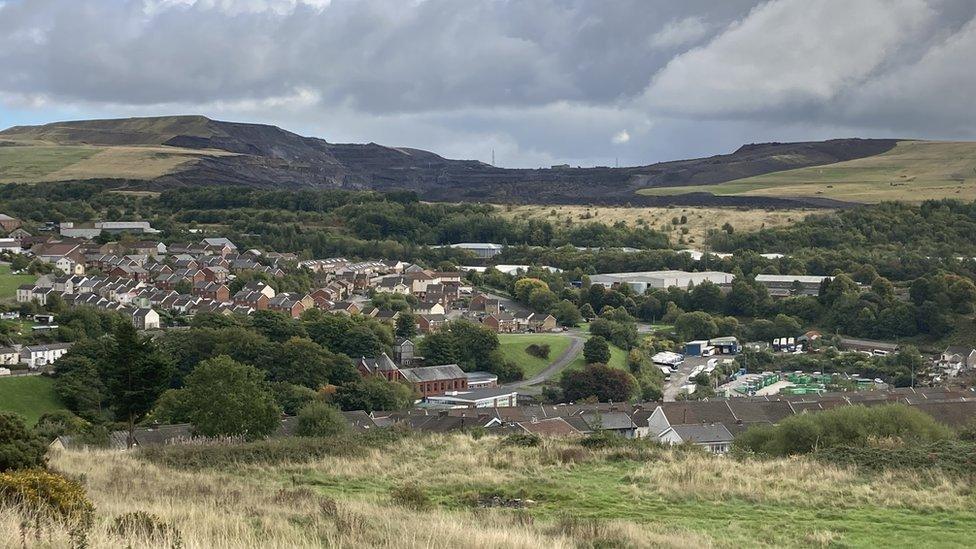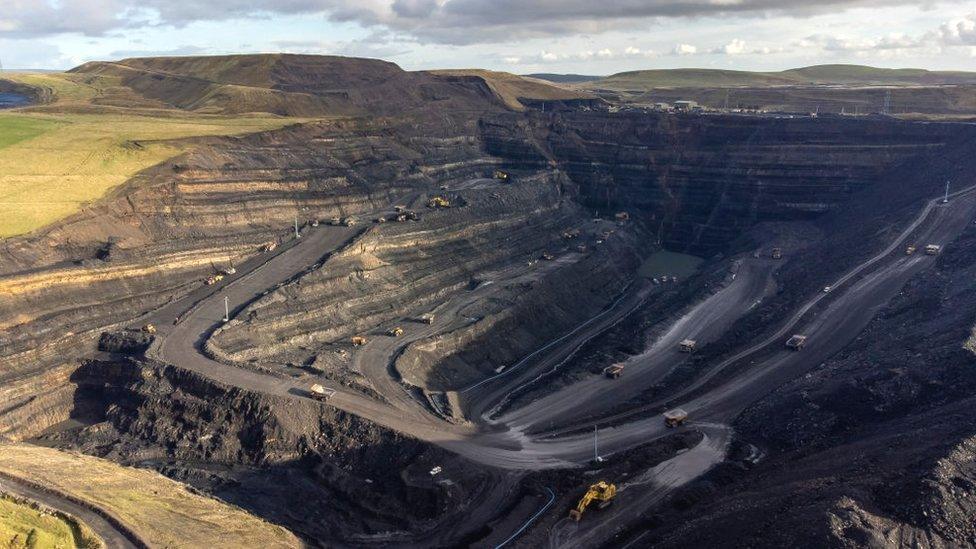Coal: Ffos-y-Fran Merthyr mine digging unlawful - lawyers
- Published
An enforcement notice telling the firm to end operations came into effect on Tuesday
Letting a huge mine keep digging months after planning permission ran out is potentially unlawful and sets a terrible precedent, lawyers have said.
An enforcement notice giving Ffos-y-Fran opencast mine in Merthyr Tydfil 28 days to stop extracting coal came into effect on Tuesday.
Barristers for climate activists argued the Welsh government and Merthyr council could have stepped in sooner.
But the council said it had a "contrary legal view of the situation".
It said it would not comment further due to "potential litigation", while the Welsh government said it wanted to bring "a managed end to the extraction and use of coal".
Mine operator Merthyr (South Wales) Ltd has been asked to comment.
The UK's largest - and now last - opencast coal mine at Ffos-y-Fran has a long and controversial history, and its closure is also turning into a drawn-out saga.
An animated map showing Ffos-y-Fran opencast site near Merthyr Tydfil and villages at the top of the Rhymney valley
Merthyr (South Wales) Ltd has until the end of July to stop all coal extraction, after its application for more time was refused in April on climate grounds.
It means the mine - the size of about 400 football pitches - will have been able to continue operating for at least 10 months past the expiry of its planning permission in September 2022.
Figures show that between 7 September 2022 and 31 March 2023, 199,307 tonnes of coal were dug up at the site.

Merthyr resident Chris Austin calls the situation "incredibly frustrating"
In an open letter of legal advice, barristers working with the campaign group Coal Action Network said the situation brought the planning system "into disrepute".
Matthew McFeeley of environmental law firm Richard Buxton Solicitors said: "It certainly sends a signal to other operators who may be considering whether to shut down their coal mine or oil well - do they need to do that?
"They may get away with a significant period of extraction without planning control."
Residents and campaigners have been protesting against the situation for months, sending in photos, video and drone footage of alleged mining.
Chris Austin, 67, who lives near the site, said it had been "incredibly frustrating".
"The local authority could have acted almost immediately but they've dragged their heels on this," he added.

People living near the site complained that their lives were being blighted by coal dust and noise
Dr Neil Harris, senior lecturer in statutory planning at Cardiff University, said the fact an application to extend the mine's life was received just days before planning permission ran out was crucial to the "elongated process" that has followed.
While the council could be seen as being "a little cautious" this was down to wanting to get the decision right in a "really complicated case" and not leaving itself open to legal challenge, he suggested.
Merthyr (South Wales) Ltd, previously said it was in "active discussion" with the council about ensuring "a safe cessation of coaling" and ongoing restoration.
The site employs about 180 staff, and supplies the steelworks in nearby Port Talbot, as well as the UK's heritage steam railways.
A Merthyr council spokeswoman said: "We have a contrary legal view of the situation. It is not appropriate to comment any further in light of potential litigation."
A Welsh government spokeswoman said: "Our position is clear - we want to bring a managed end to the extraction and use of coal.
"We are in a climate and nature emergency and the response must be swift and serious, so we can pass on a Wales we are proud of to future generations."
- Published1 June 2023

- Published27 April 2023
